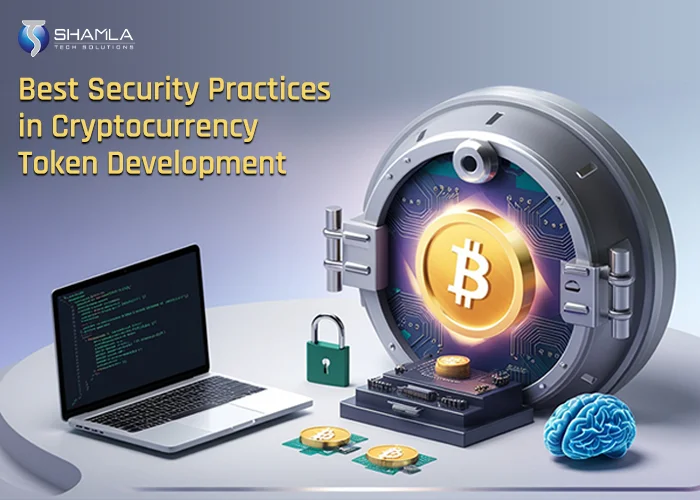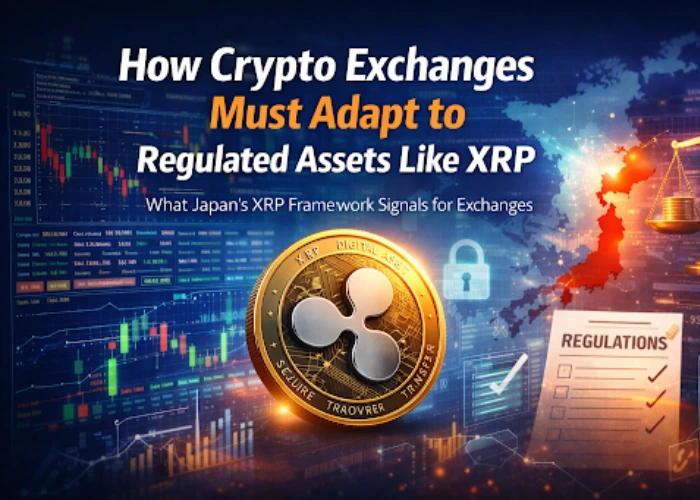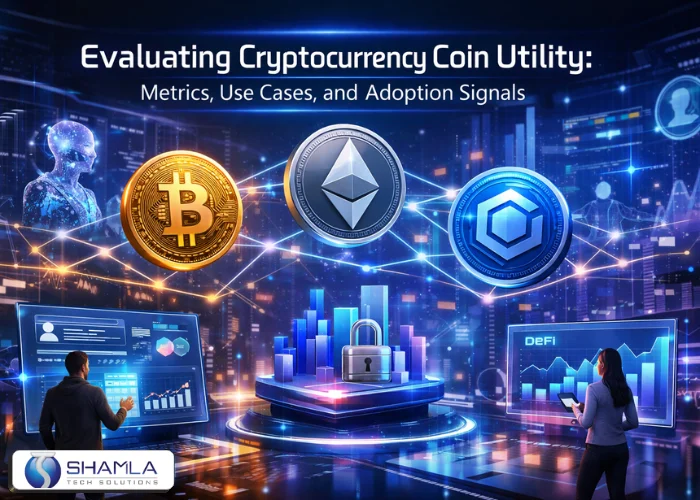Cryptocurrency token development is a key part of blockchain technology, helping drive decentralized finance (DeFi), digital collectibles (NFTs), and other blockchain uses. Tokens, powered by smart contracts, let users send, store, and trade value without middlemen. As the system grows, security becomes more important. Tokens, being valuable, are often targeted by hackers. Weaknesses in smart contracts, token systems, and blockchain platforms make strong security needed throughout the whole development process. One small mistake can lead to big financial losses, damage trust, and slow progress. So, focusing on security from the start to the finish is essential for building safe and lasting token solutions.
Why is Security Important in Cryptocurrency Token Development?
The fast and huge growth of cryptocurrency tokens has caused them to move from being simple and niche assets to a more widely known and commonly used financial tool, as trillions of dollars are now moving across different blockchain networks. Tokens, like ERC-20 and ERC-721, have also become key parts of decentralized apps (dApps), decentralized finance (DeFi) systems, and tokenized assets. This big rise in value and use has made them even more attractive to cybercriminals too. Cryptocurrency token development has become more and more complex, requiring token developers to predict and fix possible problems within smart contracts, agreement systems, and token models, in order to make sure that they all work well, stay stable, and remain secure in the long run.
Token developers face many security problems, like smart contract attacks, weak control over who can access the system, and risks like flash loan attacks or reentrancy issues. The decentralized nature of tokens makes it easier for bad actions to stay hidden, which can make it harder to hold people responsible. Also, wallets that store private keys are high-value targets for hackers, and problems in the token code can lead to big financial losses. Securing cryptocurrency tokens is very important to avoid these risks, protect user funds, and keep trust in the system. Without the right security steps in place from the start, even the best crypto token development company can fail because of preventable attacks.
Best Practices for Secure Cryptocurrency Token Development
1. Secure Smart Contract Development
In cryptocurrency token development, smart contracts are the main part of how tokens work, handling important tasks like transactions, governance, and creating new tokens. Once they are deployed, they cannot be changed, so even a small mistake in the contract code can cause serious problems, like stealing money or messing with tokens. To reduce these risks, secure coding practices are very important. Developers must follow industry guidelines like using gas efficiently, checking inputs correctly, and handling errors well. Tools like OpenZeppelin and the Solidity security guide help developers avoid problems like reentrancy or overflow attacks. Smart contract logic should also be simple and organized, making code reviews easier and allowing for future updates, which helps keep the contract safe from new threats.
Audits and peer reviews are important for the security of smart contracts, adding extra protection. Third-party audit services thoroughly test the smart contract code using automated tools and manual checks to find hidden problems like race conditions, unhandled errors, and wrong access permissions. Also, doing peer reviews within the development team encourages working together to find weaknesses, making sure many viewpoints are considered. Developers focused on security may also use formal verification to prove mathematically that the contract works as it should. This combined approach, using good coding practices, audits, and reviews, greatly reduces the risk of problems in deployed cryptocurrency tokens.
2. Choosing the Right Blockchain Platform
The blockchain platform you pick to create your cryptocurrency token needs to consider many factors that will improve the overall speed, security, and transaction costs. Ethereum is right now the most popular choice out there because of the strong network it has and many people are actually using it. It supports ERC-20 and ERC-721 token types, but it can be sometimes slow and expensive when the network is busy. Binance Smart Chain (BSC) offers you with a much faster and cheaper option with lower fees, with the use of its Proof-of-Stake (PoS) method. However, it is actually less decentralized compared to Ethereum. There are other platforms too, like Solana or Polkadot that offer new ways to improve speed, using sharding and connecting different blockchains, but they may be harder to learn and actually have only fewer tools available.
The security of a blockchain is super important because it keeps tokens safe. Ethereum’s way of doing things is strong but uses a lot of energy. Binance Smart Chain uses a method that saves energy but can make things more centralized. Solana has a unique system that’s fast but has its own trade-offs. Polkadot mixes different methods to get the best of both worlds, but nothing is perfect. At the end of the day, the key is making sure the security fits the blockchain’s needs without creating new problems.
3. Implementing Multi-Signature Wallets
Multi-signature wallets play a very important role in keeping all the cryptocurrency token funds safe. This is especially true for the projects that have to handle large amounts of money or sensitive assets, this is where security is extremely important. The requirement of multiple private keys to approve any transaction makes these wallets greatly reduce the risk of problems, such as unauthorized access or theft. In the traditional wallets, if one private key gets stolen, the funds are immediately at risk. However, here in multi-signature wallets, even if one key gets to be compromised, the risk of exposure is actually much lower because extra signatures from other trusted people are needed here to complete a transaction.
But the benefits of multi-signature wallets don’t end just with security. They also provide you with a vital tool which helps you to manage how decisions are actually being made in cryptocurrency projects. As you will require a group of people to approve and sign off on transactions, these wallets will definitely make sure that all the decisions are more decentralized and open, which is very important for the projects that want to fairly spread out control. This is really necessary for decentralized organizations (DAOs) or token projects where multiple people should have a say, rather than just one person controlling everything.
4. Regular Code Audits and Testing
Frequent, regular, and very important code audits and testing are absolutely necessary in the development of cryptocurrency tokens because they are essential for finding any weaknesses before bad actors can take advantage of them. Since smart contracts cannot be changed after they are launched, any problems in the code become permanent and cannot be fixed unless directly addressed. Regular audits, which are always done by trusted third-party security companies, will include manual reviews and automated tools which will be used to find any kind of common weaknesses like reentrancy attacks, gas limit issues, and overflow/underflow problems. These audits are also very important for the spotting of even small errors that could lead to major serious problems. Without regular testing and audits, even well-written code could actually still be vulnerable to new types of attacks and weaknesses in the blockchain systems.
Testing, especially through automated tools and test environments, ensures that token contracts are not only secure but also work as expected in many different situations. This includes testing how the system handles heavy traffic, extreme situations, and unusual user actions that could be missed otherwise. Automated tests are often added to with fuzz testing, where random inputs are put into the code to try to break it or find hidden problems. Also, continuous integration (CI) systems, which are connected to automated testing, make the code more reliable by checking that every change to the code meets high security standards. These careful testing and audit processes are the foundation of secure token development and greatly reduce the chances of problems after the token is launched.
5. Protecting Token Private Keys
Losing private keys in cryptocurrency token development can, without a doubt, result in the permanent loss of access to important token funds or valuable assets, which are crucial to the whole project. Private keys are the keys that are actually used in the controlling and managing of tokens in a blockchain network. If these keys are stolen or lost in any way, the scammers can easily move funds, empty wallets, or even change the token balances without any kind of permission needed. This is so dangerous in high-risk token environments where large amounts of money or sensitive information are at stake. Since these tokens can’t be changed and transactions can’t be undone, losing or having private keys stolen is unfortunately a permanent security issue in this case, which shows you the reason why strong key management in crypto token development is a huge deal.
To reduce all these risks that come with losing private keys, you can store them in hardware wallets, like Ledger or Trezor which helps you to store the keys offline, which protects them from online threats like hacking or phishing. Multi-signature wallets will also offer you with much more security by requiring multiple people to actually sign off on any transaction. Additionally, any kind of key encryption should be used here to make sure keys are stored in a secure, unreadable way. For more large projects or token services, using key management systems (KMS) and secure key recovery methods will make sure that all the keys get to be safely stored in different places and can only be accessed by trusted people.
6. Ensuring Secure Token Minting and Burning
Securing the token minting and burning processes will help you a lot in the prevention of any kind of misuse and also keep the token supply completely safe and reliable. Minting is the process in which you create new tokens, and if this process is not properly controlled, it can be easily misused to increase the token supply. These attackers may find and take advantage of weaknesses in the minting functions to create too many tokens, which can mess up the token’s economy and its value. To stop such problems, strict controls should be put in place to make sure only trusted accounts can trigger minting actions. Also, using limits like rate controls and maximum token amounts can help prevent large-scale attacks that try to mint a huge number of tokens. Similarly, the burning process, which is about removing tokens from circulation to lower the supply, should be clear and easy to check, ensuring that tokens cannot be burned for bad reasons to change market prices.
Preventing problems during both token creation and destruction requires designing minting and burning systems that are hard to misuse and control without permission. Developers should use contracts that can’t be changed and make sure the owner doesn’t have too much power to reduce the chance of bad actions. One popular approach is to use decentralized voting or require multiple people to approve minting or burning actions, which helps keep decisions clear and fair. Both minting and burning actions should also be able to be checked by everyone through on-chain logs to guarantee openness and responsibility. Additionally, by adding safety features like pause options in smart contracts, the token process can be stopped if something goes wrong, making sure that any bad actions can be stopped quickly without causing harm to the whole system. This well-planned method keeps the whole process of token creation and removal secure, ensuring the token’s integrity remains safe.
7. Using Upgradable Smart Contracts
Upgradable smart contracts offer big advantages for cryptocurrency token development by making it much easier to fix security issues and add new features without needing to redeploy the whole contract. As blockchain technology keeps changing, new weaknesses and problems come up, and upgradable contracts give a flexible way to adjust to these changes. By using upgradeable patterns like the proxy pattern, developers can quickly fix serious security issues, make improvements, or even change token rules without affecting the contract’s state or asking users to interact with a new address. This helps keep security up to date and allows developers to react fast to new threats, keeping the token system safe from bugs and attacks.
To avoid problems with hardcoded weaknesses, the proxy contract design is commonly used because it separates the contract’s rules from its data storage. This separation lets developers update the contract’s rules with a new version while keeping the stored data safe. The proxy contract acts as a middleman that sends requests to the current version of the contract. This setup reduces the risks that come from hardcoded addresses, rules, or settings, letting developers change the logic without hurting security. By making sure the contract can change while still working with older versions, developers can fix new problems as they appear, ensuring the long-term safety and stability of token systems.
8. Secure Token Transfers
Making sure that all the token transfers are secure from start to finish is extremely important in cryptocurrency token development because it definitely will directly affect the reliability of transactions and the trust that people place in the blockchain system. Every token transfer should be done through a thorough checking by the network, and making use of strong and dependable cryptographic methods, like elliptic curve digital signature algorithms (ECDSA) or EdDSA, helps make sure that each transaction is authentic. Also, developers should focus on managing nonces properly and doing sequence checks to stop replay attacks, where the transactions could be mistakenly or intentionally sent again.
To avoid issues like double-spending and changing transactions, developers must add strong and dependable systems to the token’s transfer process. Double-spending, where the same tokens are spent more than once, can be stopped by making sure transactions are checked by the consensus system before they happen, and using timestamped logs for transactions ensures each one is unique. Transaction malleability, where transaction details are changed before confirmation, can be prevented by using secure transaction hashing systems and adding cryptographic proof to make sure each transaction stays intact. By tracking nonces properly and protecting the whole transaction process with immutability, developers can make sure that once a transaction is sent to the network, it is final, cannot be changed, and is safe from manipulation, ensuring the transfer process is both trustworthy and secure from beginning to end.
9. Data Privacy and Secure Authentication
Since dApps will work on public blockchains, keeping all the data private will require the usage of using strong encryption methods, like end-to-end encryption (E2EE) and zero-knowledge proofs (ZKPs). These methods will help you keep all data private while still being checked on the blockchain. Data storage should also be decentralized using the systems like IPFS or Filecoin, which will let users to keep control of their data without it being exposed to any central servers or bad actors. Additionally, the use of data anonymization and reducing the amount of data stored on the blockchain can lower the risk of exposing private user information.
To make sure that the total security is super strong and to stop unauthorized access, it’s important to use secure ways for users to log in, like OAuth or multi-factor authentication (MFA). OAuth lets users to easily log in through trusted third-party services, keeping the login process to be much secure with proven methods while still protecting user privacy by not storing sensitive login details on the dApp. Multi-factor authentication will definitely add an extra layer of security by asking the users to confirm their identity in more than one way, like with SMS tokens or security keys, along with their password.
10. Compliance and Regulatory Adherence
The biggest problem faced by crypto tokens is the one that comes with not meeting the compliance in a proper way. There are many regulations set by regulatory bodies such as those from the U.S. Securities and Exchange Commission (SEC), the European Union’s MiCA (Markets in Crypto-Assets) rules, and the Financial Action Task Force (FATF). Following the rules set by these bodies is super important for you to make sure that your token project actually follows all the regulations, which will help you to avoid getting into any kind of legal trouble. Token developers must also carefully go through securities laws to figure out if a token is a security. You can use the Howey Test in the U.S. for this or similar tests that are being done in other countries.
Following the rules also needs clear and open audit trails, which can be done by using unchangeable records on the blockchain. This way, all actions can be checked and confirmed. By making sure these security steps are built into the development process from the beginning, token developers can be sure that their projects follow global rules, while also gaining user trust and making sure they follow the changing laws in the crypto world.
Conclusion
Security in crypto token development has become super important, as any weaknesses in the system might lead to a situation where you’d have to face huge financial losses and serious damage to your project’s reputation. As blockchain systems continue to grow, so do the risks, so you should make strong security practices a key part of your development cycle.
Shamla Tech is a cryptocurrency token development company that understands how important it is to protect every part of token setup, from smart contract security to safe private key management. Our cryptocurrency token development services include the usage of latest security methods which will regularly check the code, and follow the best industry practices to make sure that your token stays safe from attacks. When you work with us, you get a trusted partner focused on creating secure, easy-to-use, and legally correct crypto tokens.








